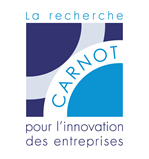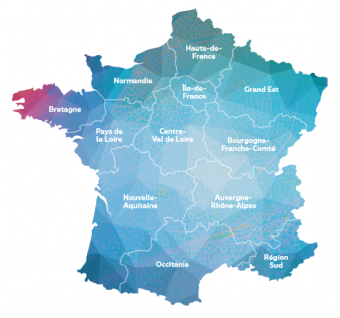Bourgogne-Franche-Comté
Examples of partnerships with companies in the region
Verallia has adopted a digital twin to train people in key machine maintenance on its continuous production line
Partnership Carnot ARTS - VeralliaAs demand for glass packaging increases, production units are working day and night. Thanks to Carnot ARTS, Verallia now has a virtual training application for preparing maintenance work on a crucial component: the gas mixer that powers its furnaces.
Verallia has adopted a digital twin to train people in key machine maintenance on its continuous production line
Supporting Innovation
Verallia’s plant in Chalon-sur-Saône supplies glass containers to agri-food businesses and is home to the Verallia France Glass School, created to meet the specific needs of this industry. The plant has a single air/gas mixer that powers all of the glass melting burners. The slightest incident affects both production and delivery schedules. While the technicians who work on the mixer maintenance have obviously received theoretical training, it is not possible to make the mixer available to train them in how to handle specific incidents. To show technicians what to do in the event of breakdowns or damage, Institut Carnot ARTS has created a special simulator with a digital twin of the technical equipment that reproduces not only the machine, but all of the possible interactions as well.
The client needs
Verallia is an independent group with around 10 000 employees and 32 glass manufacturing plants spread throughout 11 countries. It is European leader – and the world's third largest producer – of glass packaging for beverages and food products. Verallia provides innovative, customized and eco-friendly solutions for more than 10 000 businesses worldwide. To meet growing demand, the Group is focused on adapting its existing production lines and is harnessing AI to bring it into the Industry 4.0 era. In the absence of a national glass manufacturing sector, Verallia founded its own Glass School over 50 years ago and approached the Carnot ARTS Image Institute to create an interactive simulation of work on the mixer with a view to training operators. During training sessions, the simulator is brought to life by a virtual reality mask that displays a simplified but functional replica of the machine, allowing operators to gain a better understanding of how the actual system works and the machine’s reactions.
Partnership
Institut Image is the part of Carnot ARTS that specialises in virtual immersion techniques. To design the simulator, it first had to analyse this complex process in order to define the appropriate level of simplification that would make the application functionally representative and faithful to the real system. The operator is thus immersed in a representation of the machine together with realistic possible interactions.
To develop this special digital twin, scientific obstacles needed to be removed, in particular to identify the correct cognitive load. This allows the operator to focus on the task in hand – a must for ensuring the relevance of the learning application. This is the case when operators have to move around so that neither task specialization nor unnecessary movements distract them, and during interactions with the virtual system to ensure that they have a clear idea of how to manipulate the different components.
The partnership has provided Verallia with an effective learning tool that limits the scope for incidents affecting a key component of its production process.
PROTEOR prostheses will now be adapted to everyday living restrictions
Partnership Carnot ARTS - PROTEORIn addition to facilitating mobility, PROTEOR has teamed up with Carnot ARTS to restore lower limb capacity by reducing restrictions and inconveniences
PROTEOR prostheses will now be adapted to everyday living restrictions
Supporting Innovation
Lower-limb amputees now have access to increasingly light prostheses that are much easier to manipulate and may even be adapted to a particular sporting activity. If walking is possible, certain situations require compensating movements on the part of the prosthesis wearer. PROTEOR wanted to get around replacing a missing limb by a passive prosthesis and it harnessed the research of the Georges Charpak Human Biomechanics Institute (IBHGC) to achieve major progress in movement over uneven or unstable ground or when the body is bent over. This research culminated in the creation of a microprocessor-controlled knee-ankle-foot prosthesis, an innovation that has drawn praise from the DGA, the French Defence Procurement Agency.
The client needs
The PROTEOR Group has been meeting the needs of physically handicapped people who require prostheses since it was set up in Burgundy in 1913. It does business in fiercely competitive international markets, notably in Europe, but its “human-first” strategy based on a customised offering has turned it into a key market player. PROTEOR is in constant contact with patients and invests in R&D to deliver reliable and accessible solutions to both individuals and professional customers. This constant quest for improvement highlighted the potential benefits of the close study of prosthesis-wearer walking patterns during an initial partnership with IBHGC and this first phase was rounded out by digital solutions for prosthetic components. PROTEOR and Carnot ARTS have been innovating since 2010 in the whole area of complex movement scenarios. To bolster its position, particularly with major institutional contractors, PROTEOR has renewed its partnership, showcasing the mutual contributions of both organisations.
Partnership
IBHGC is a cross-disciplinary research unit providing expertise in human biomechanics within Carnot ARTS. It is tasked with studying all situations involving injuries or malfunctions, together with the means of preventing, diagnosing and dealing with these situations.
Successive CIFRE PhD agreements have played a big role in developing the modelling base and studying the effects of prosthetics materials on movement by combining an experimental approach with digital modelling.
This cooperation has been in progress since the early 2000s and has enabled Proteor to benefit from cutting-edge research within a relationship based on mutual trust and exchange. The diversity of patient case studies, their evolution over time and the durability of ties with PROTEOR have facilitated the deployment of embedded technologies in a product that has been awarded a prize by the French Ministry of Defence.
PROTEOR continues to focus on customisation and research into adapting to everyday living restrictions and the quality of the fit in order to secure its future development.
Carnot ICÉEL contributes to Crossject successful completion of a specific needle-less syringe
Partnership with ICÉEL Carnot Institute and CrossjectCrossject has reached its intended goal of providing safe medical injection without the use of a needle in a format adapted to the needs of both the professionals and the patients.
Carnot ICÉEL contributes to Crossject successful completion of a specific needle-less syringe
Supporting Innovation
Crossject aspires to make the injection of medical products at a more reliable pace with a single button press using NFIT (Needle-free injection technology). Indeed, the needle-free procedure minimises the stress induced by the patient as well as the unpredictable effects upon the medical injection considerably. ZENEO®’s commercialisation move comes after several years of research in co-operation with doctors and patients. The simple ‘single-use’ device guarantees the correct quantity of products in an ideal environment. The unique highly specialised expertise acquired has made it possible for Crossject to become a key player in his field. The SME undeniably provides enhancements that can help improve the self-injection process when caring for chronically ill persons and/or in an emergency setting.
The client needs
Crossject has been demonstrating the validity of its concept in 2005 since day one, when conducting the first controlled clinical evaluation of a specific influenza vaccine. Initially, concrete steps had to be taken in terms of ergonomics and regulation of injection quantity. The device was designed to allow adaptation to different fluid injection viscosity volumes according to the depth desired, whether intradermal, subcutaneous or intramuscular.
However, the conventional methods used to validate the device effectiveness fell short of expectations. According to statements by Patrick Alexandre, the Crossject’s CEO, the partnership with a team of the ICÉEL Carnot Institute*, a Fluid Dynamics specialist, enabled to explore solutions very far apart from the traditional reasoning.
For Crossject, the TJFU** Laboratory, a unit of Carnot ICÉEL, has drawn on its experience in modelling and implementation of pulsed microjet nozzles to conceive an innovative injection duct A key component of the delivery device, it is the subject of numerous patents placing Crossject in a situation of authority over the competition.
* ICÉEL : Institut Carnot Énergie et Environnement en Lorraine
** Technical centre specialising in abrasive water jet destined to the cutting of metal parts
*** Technological Resource Centre
Partnership
The ICÉEL Carnot Institute brings together 22 laboratories. Its R&D spectrum allows the backing of projects with a significant social impact in areas relating to energy and environmental sustainability.
The Institute acting as the R&D partner of a majority of the largest manufacturers, as well as SME’s matching Crossject’s profile, has helped the latter to innovate by breaking with normal practice. As a pulsed microjet specialist, TJFU’s CRT***, has been a 10-20% hydrodynamic efficiency saver for the injector duct using an innovative geometry optimisation. Abdel Tazibt, a TJFU CRT researcher, underscores the importance of such contributions for the successful improvement of ZENEO® in terms of effectiveness.
To further enhance the ZENEO®-designed syringe’s flexibility and robustness and reduce costs, co-operation is being continued and extended beyond the common patent application.
5 out of 7 products to be used during emergency and disaster situations are currently awaiting regulatory approval.
In 2017, ZENEO® has scooped the Janus Award, in the Prospective category, acknowledging the impact of user behaviour, the introduction of newer applications and the emergence of a new economy.
Regions
Bourgogne-Franche-Comté
Bretagne
Centre-Val de Loire
Grand Est
Hauts-de-France
Île-de-France
Normandie
Nouvelle-Aquitaine
Occitanie
Pays de la Loire
Région Sud


